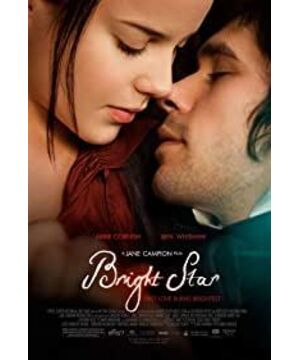Almost every poet writes about a girl with a hazy figure, which makes them think day and night, and makes them unable to leave. They are like the hanging moon, like the blooming lily of the valley in spring, nourishing the poet's brush and ink and affecting the poet. of love. Keats is such a penniless but talented romantic poet who falls in love with a girl next door who pursues fashion and is keen on sewing. Fanny is an ordinary girl. She is neither smart nor sensitive. At first, she was only curious about Keats. Such a melancholy and quiet life was out of tune with her world. She asked her younger siblings to buy his Endymion. Just to see if he's a fool. She tried to read his poems, Milton Byron in order to get closer to him.
Keats' good friend Charles plays an unlikable character in the film, except for his utterly possessive obsession with Keats and Keats' poems, using the phrase "worldly life will corrode your talents". reason. Charles compares Fanny's intrusion into the life of the poet Keats to a disaster, in which he imagines that Keats would descend into the clouds to bury himself in exchange for Mrs Keats' French ribbon in exchange for his marriage and livelihood. Even the most romantic poet has to consider the difficulties of reality in the face of marriage. He leaves Fanny again and again and returns to the manor again and again. He succumbs to the vitality and all the additional suffering brought by love.
Love begins with curiosity and goodwill, no one can hear the gentle footsteps of its arrival, and when it is brewed, it turns into a huge wave in the end. When the poet fell ill and the flowers in her house rebuked her for her ruthlessness and almost died, their love became a vast ocean. No, no, maybe sooner, long before Keats left Fanny and kissed letters after letters, before Keats told the lips of the girl in his dreams, before they leaned the bed against each other in two rooms. Lightly touch the front on the same wall.
The poet's love, accompanied by the shadow of death, perhaps death fulfills the poet's love, they don't have more time to quarrel and hurt in the cold war, death forces love to squeeze out the last fragrance, death is not terrible for poets, Perhaps there is also the mysterious attraction and eternal peace, if not in the bleak world, there is still concern. On the eve of their parting they held their heads together and imagined Keats' life back from Italy, of course they would get married, and live in a country house, near mother, with apple trees and a garden full of wildflowers, even in the sun With their heads high, they still had to lie down on the bed. He kissed her over and over again, using his touch to memorize her lips, her wrists, and her chest.
Keats went to Rome across the ocean to recover from his illness. Everyone knew that this was a trip that would never return, but when he heard the news of Keats' death from Charles, Fanny couldn't listen and left the living room. She called her mother on the stairs, she pointed to her chest and wept bitterly. Death is far more terrifying than parting. You can still hope to meet when you are born, but where do you go to find the dead when you die? Fanny sewed mourning clothes for herself with needles and thread, and walked slowly out of the manor, whispering in the winter woods of her hometown the love poem the poet made for her: "Bright star, I wish to be as firm as you, but I don't want to hang high. The night sky, alone, with eyes open forever--"
Later we know that Fanny mourned for Keats for seven years, and did not marry until the twelfth year after the poet's death. She kept Keats's love poems and his Give her the ring until death joins them again.
At the age of twenty-five, Keats lived a life of misery and suffering, and his love with Fanny was not blessed by the world. He died with the torment of love, died of poverty, died of sickness, and died of an unloved girl. A foreign land thousands of miles away.
The rhythm of the whole film is moderate, the colors are bright and vivid, and it is not overly delicate. The words jumping in the sun, the colorful blocks of spring, the butterflies imprisoned in the glass bottle, the smile on the poet's pale sick face, and the frozen The dark night on the coffin leads the poet to die calmly and quietly, so young, so fresh, so full of music and poetry.
The director has no intention to add too much life philosophy and life thinking to this love story. It is a little trivial and imperfect, but he is as real as our life, as trivial as our life, he loves her, and she loves him, enough .
View more about Bright Star reviews











